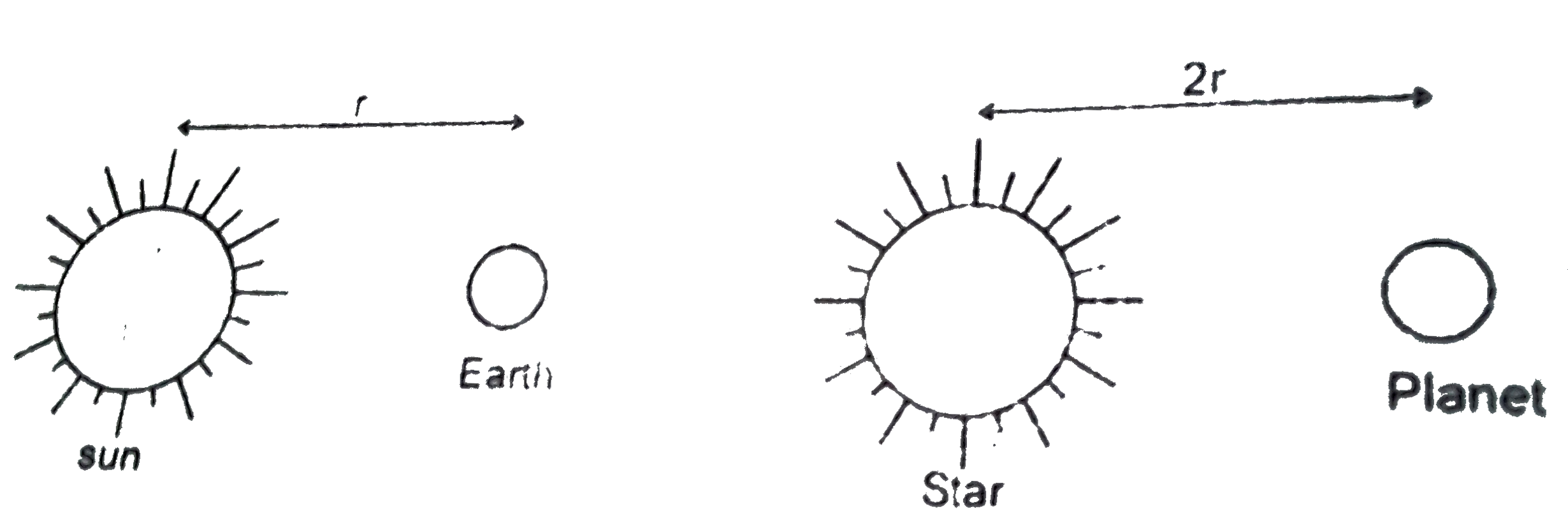In an imaginary planetary system, the central star has the same mass as our sun, but is much brighter so that only a planet twice the distance between the earth and the sun can support life. Assuming biological evolution ( including aging process etc.) on that is similar to ours, what would be the average life span of a 'human' on that planet in terms of its natural year? The average life span of a human on the earth may be taken to be 70 years.
To solve the problem, we need to determine the average lifespan of a human on an imaginary planet that is twice the distance from its star compared to the Earth-Sun distance. We will use Kepler's Third Law of planetary motion to find the relationship between the orbital period of the planet and its distance from the star.
1. Identify the parameters:
- Let the distance between the Earth and the Sun be a.
- The distance from the central star to the imaginary planet is a′=2a.
- The average lifespan of a human on Earth is 70 years.
2. Apply Kepler's Third Law:
- According to Kepler's Third Law, the square of the orbital period T of a planet is directly proportional to the cube of the semi-major axis R of its orbit:
T2∝R3
- For Earth, we can write:
T21∝a3
- For the imaginary planet, we write:
T22∝(2a)3=8a3
3. Set up the ratio of the periods:
- From the above equations, we can set up the ratio:
T22T21=8a3a3=8
- Taking the square root gives:
T2T1=√8=2√2
4. Express T2 in terms of T1:
- Therefore, we can express T2 as:
T2=2√2T1
5. Calculate the lifespan on the imaginary planet:
- Since T1 (the period for Earth) corresponds to 1 year, the period for the imaginary planet becomes:
T2=2√2 years
- To find the average lifespan of a human on the imaginary planet, we can set up the following relationship:
Lifespan on imaginary planet=70 yearsT2=702√2≈24.74 years
Final Answer:
The average lifespan of a human on that imaginary planet would be approximately 24.74 years.
- Let the distance between the Earth and the Sun be a.
- The distance from the central star to the imaginary planet is a′=2a.
- The average lifespan of a human on Earth is 70 years.
- According to Kepler's Third Law, the square of the orbital period T of a planet is directly proportional to the cube of the semi-major axis R of its orbit:
T2∝R3
- For Earth, we can write:
T21∝a3
- For the imaginary planet, we write:
T22∝(2a)3=8a3
- From the above equations, we can set up the ratio:
T22T21=8a3a3=8
- Taking the square root gives:
T2T1=√8=2√2
- Therefore, we can express T2 as:
T2=2√2T1
- Since T1 (the period for Earth) corresponds to 1 year, the period for the imaginary planet becomes:
T2=2√2 years
- To find the average lifespan of a human on the imaginary planet, we can set up the following relationship:
Lifespan on imaginary planet=70 yearsT2=702√2≈24.74 years
The average lifespan of a human on that imaginary planet would be approximately 24.74 years.
Topper's Solved these Questions
- GRAVITATIONBook:ICSEChapter:GRAVITATIONExercise:CONCEPTUAL SHORT ANSWER QUESTIONS WITH ANSWERS
Explore 22 Videos
- GRAVITATIONBook:ICSEChapter:GRAVITATIONExercise:LONG ANSWER QUESTIONS
Explore 13 Videos
- GRAVITATIONBook:ICSEChapter:GRAVITATIONExercise:FROM THE HUBBLE TELESCOP
Explore 2 Videos
- FRICTIONBook:ICSEChapter:FRICTIONExercise:Selected problems
Explore 30 Videos
- INTERNAL ENERGY Book:ICSEChapter:INTERNAL ENERGY Exercise:SELECTED PROBLEMS (FROM HEAT ENGINES)
Explore 21 Videos
Similar Questions
Average life span of human RBC is
View SolutionIn a certain binary star system, each star has the same mass as our sun. They revolve about their centre of mass. The distance between them is the same as the distance between earth and the sun. What is their period of revolution in years ?
View SolutionWhat is an average life span of erythrocytes?
View SolutionIf the distance between the earth and the sun were half its present value, the number of days in a year would have been
View SolutionIf the distance between the earth and the sun were half its present value, the number of days in a year would have been
View SolutionIf the distance between the earth and the sun were reduced to half its present value, then the number of days in one year would have been
View SolutionWhen a planet moves around the sun
View SolutionLet a star be much brighter than our sun but its mass is same as that of sun If our earth has average lift span of man as 70years In the earth like planet of this star system having double the distance from our star find the average lift span of a man on this planet in terms of our year
 .
.
View SolutionWhich planet is farthest to Sun ?
View SolutionPlanet nearest to sun is
View Solution

